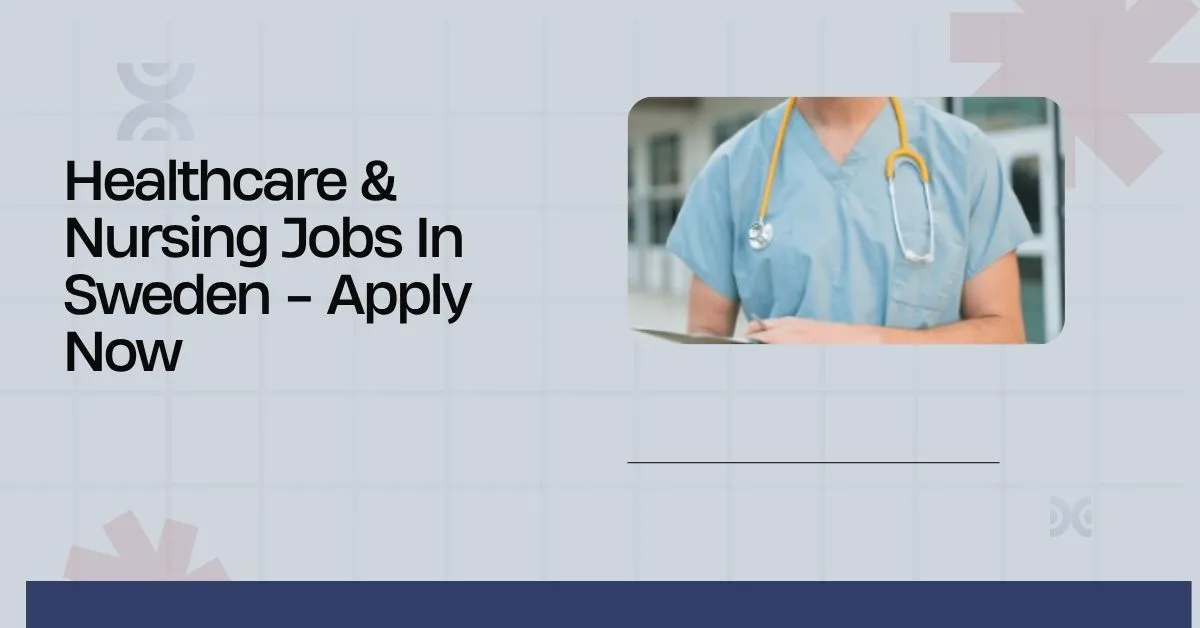Imagine building a nursing career in a country that champions work-life balance, professional respect, and a high standard of living. Sweden’s world-renowned healthcare system is actively seeking skilled nurses, offering a clear pathway for international professionals, including visa sponsorship.
While the journey requires dedication, particularly in achieving Swedish language proficiency and obtaining a license from the Socialstyrelsen, the reward is a stable, deeply respected career. With competitive monthly salaries ranging from 28,000 to over 50,000 SEK and unparalleled benefits, your skills can become your passport to a fulfilling life in one of the world’s most progressive societies.
The Swedish Healthcare System & Job Market
- Publicly Funded, Regionally Run: Healthcare is primarily tax-funded and managed by 21 regional councils. This means you apply to a specific region (e.g., Region Stockholm, Region Västra Götaland) or a private provider within it.
- High Demand Areas: The need is greatest in geriatric care, psychiatry, primary care, and specialized hospital units like ICU and surgery.
- Work Culture: Expect a flat hierarchy, a strong emphasis on teamwork, and a focus on evidence-based practice and continuous learning.
The Mandatory Gateway: Licensing with Socialstyrelsen
You cannot work as a nurse in Sweden without a license from the National Board of Health and Welfare (Socialstyrelsen). This is the most critical step.
Key Licensing Requirements:
- Recognition of Education: Your nursing degree must be deemed comparable to a Swedish nursing degree. This involves a detailed application with certified documents.
- Swedish Language Proficiency: You must demonstrate proficiency at the C1 level according to the Common European Framework of Reference for Languages (CEFR). This is advanced fluency, required for safe patient care and precise documentation.
- Accepted Proof: Passing the Swedish for Healthcare Professionals exam or providing a certificate from a recognized university.
- Verification of Professional Experience: You must provide proof of your work experience.
- Possible Supplementary Education: If your education is not fully equivalent, Socialstyrelsen may require you to complete supplementary courses or a proficiency test in Sweden.
Realistic Salary & Benefits
- Monthly Salary (SEK):
- Entry-Level: 30,000 – 35,000 SEK
- Experienced (2+ years): 36,000 – 42,000 SEK
- Specialized/Senior: 43,000 – 50,000+ SEK
- Outstanding Benefits:
- Generous Paid Leave: Minimum of 25 paid vacation days and 16 public holidays.
- Parental Leave: Extensive paid leave for both parents.
- Pension & Insurance: Comprehensive social security system.
- Professional Development: Paid time and funding for continuous education is standard.
Application Plan: A Step-by-Step Guide
This process requires patience and should be started many months in advance.
Phase 1: Pre-Application (Start Here)
- Initiate the Socialstyrelsen Application: Begin the license assessment process immediately. This is the longest step.
- Start Learning Swedish to C1 Level: Enroll in intensive language courses focused on healthcare terminology. Do not delay this.
- Prepare Your Documents: Gather diplomas, transcripts, and proof of experience. Have them officially translated into Swedish or English.
Phase 2: Job Search & Relocation
- Search for Jobs: Once your license is in process or approved, target your job search.
- Official Portals: Use regional council career sites region-specific sites).
- Recruitment Agencies: Agencies like Academic Work and Manpower specialize in healthcare.
- Keywords: Search for “sjuksköterska” (nurse) and the region name.
- Secure a Job Offer: A formal job offer is required for your work permit.
- Apply for Work & Residence Permit: Your Swedish employer will initiate the permit application with the Swedish Migration Agency (Migrationsverket).
Critical Challenges & Success Tips
- The Language Barrier: The C1 requirement is the single biggest hurdle. It requires dedicated, long-term study.
- Bureaucratic Timelines: The Socialstyrelsen and Migration Agency processes can take 6-12 months combined. Plan your finances accordingly.
- Cultural Adaptation: Be prepared for a collaborative, non-hierarchical work environment where your input is expected.
Top Tips for Success:
- Lead with Your License: In your job applications, clearly state your Socialstyrelsen application status.
- Target High-Need Regions: Applying to regions outside major cities (e.g., rural areas in Jämtland or Västernorrland) can speed up the hiring process.
- Network: Use LinkedIn to connect with recruiters at Swedish healthcare regions and other international nurses in Sweden.
Conclusion
A nursing career in Sweden represents a long-term investment in both professional growth and quality of life. The path demands commitment to mastering the language and navigating the licensing process, but the outcome is a role within a system that truly values its healthcare workers.
For nurses seeking a stable, respected profession in a society known for its fairness and high living standards, Sweden offers a uniquely rewarding opportunity. It is more than a job; it is a chance to build a meaningful and balanced life.
Frequently Asked Questions
What is the average salary for a nurse in Sweden?
- Entry-Level: 28,000 – 35,000 SEK per month
- Experienced: 35,000 – 45,000 SEK per month
- Specialized/Managerial: 50,000+ SEK per month
Is visa sponsorship available?
Yes. Many Swedish healthcare employers are licensed to sponsor work permits for qualified international nurses and often provide relocation support.

